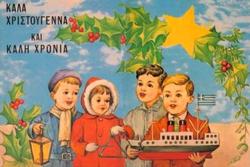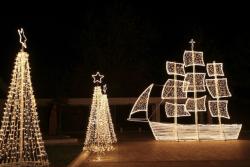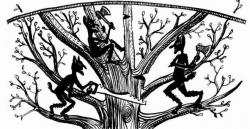Greek Family Christmas
 While Greece will still be under a strict lockdown for the 'Holiday Season', with a 10:00pm to 5:00am curfew in effect, Greek citizens will be able to celebrate together in groups of nine people from two families on Christmas Eve, Christmas Day, New Year's Eve and New Year's Day 2021. In order to partake in the festivities, Greeks hoping to share their holiday with family and friends should send an SMS with the number 6 to the government's toll-free 13033 hotline number. Families who are together over the holidays this year will have to forego big holiday parties and celebrations out on the town, once common occurrences in the times before Covid-19, and look to the ways Greeks have traditionally celebrated the Christmas and New Year season in the past, at home with family and friends.
While Greece will still be under a strict lockdown for the 'Holiday Season', with a 10:00pm to 5:00am curfew in effect, Greek citizens will be able to celebrate together in groups of nine people from two families on Christmas Eve, Christmas Day, New Year's Eve and New Year's Day 2021. In order to partake in the festivities, Greeks hoping to share their holiday with family and friends should send an SMS with the number 6 to the government's toll-free 13033 hotline number. Families who are together over the holidays this year will have to forego big holiday parties and celebrations out on the town, once common occurrences in the times before Covid-19, and look to the ways Greeks have traditionally celebrated the Christmas and New Year season in the past, at home with family and friends.
Although the iconic Greek tradition of 'caroling', when children go door-to-door singing Christmas carols with their ringing triangles, may have been banned this year due to the pandemic, people will still sing their favourite traditional carols at home. Spending the holiday season together, singing carols, baking cookies and playing board games, families are going back to tradition. It may seem like this family-oriented Christmas was born out of force due to the virus restrictions, many people have been drawn to simple holiday celebrations at home this year after understanding how very quickly the world can change, and how much their families mean to them. *How people behave over Christmas, will determain if restrictions remain the same for the New Year 2021 festivities.
Hosts holding gatherings that are in violation of restrictions face a fine of 3,000 Euros and their guests of 300 Euros each, while businesses operating illegally face a fine of 10,000 Euros. Churches will be open on Christmas Day, New Year's Day and Epiphany for a restricted congregation. *Following Christmas, it was announced that all restrictions will remain for New Year's celebrations.
 After Greece gained its independence, the new country acquired Othon, a Bavarian, as its king, who introduced the Christmas tree in 1833. Until then, the Greeks had decorated Christmas boats in honour of Saint Nicholas, patron saint of sailors. Happily, the tradition is now resurgent, as island folk and coastal communities decorate holiday boats, called 'Karavaki' in Greek, in appreciation to St Nicholas for bringing their sailors around the world home safely for the holidays. The tradition has spread throughout Greece and now boats in all shapes and sizes are considered mainstay Christmas decorations in people's homes and in public squares throughout Greece.
After Greece gained its independence, the new country acquired Othon, a Bavarian, as its king, who introduced the Christmas tree in 1833. Until then, the Greeks had decorated Christmas boats in honour of Saint Nicholas, patron saint of sailors. Happily, the tradition is now resurgent, as island folk and coastal communities decorate holiday boats, called 'Karavaki' in Greek, in appreciation to St Nicholas for bringing their sailors around the world home safely for the holidays. The tradition has spread throughout Greece and now boats in all shapes and sizes are considered mainstay Christmas decorations in people's homes and in public squares throughout Greece.
 From Christmas Day until the Feast of the Epiphany, on 6th January, Greeks watch over their homes especially carefully, looking for moved items or stolen Christmas goodies. That’s because, according to Greek folklore, a group of tiny goblins, called Kalikantzaroi, come out during the holiday period, hoping to wreak some havoc on mankind. The Kallikantzaroi come up to the world during this period every year beacause Christ has not yet been baptized and therefore cannot protect humanity from evil. On 6th January, the Epiphany, which commemorates both the day the three Magi (wise men) visited Jesus and the day Jesus was later baptized, the Kallikantzaroi are forced off the planet surface and return back down to the base of the tree of life to discover that it has been healed. They then have to start their dastardly work all over again.
From Christmas Day until the Feast of the Epiphany, on 6th January, Greeks watch over their homes especially carefully, looking for moved items or stolen Christmas goodies. That’s because, according to Greek folklore, a group of tiny goblins, called Kalikantzaroi, come out during the holiday period, hoping to wreak some havoc on mankind. The Kallikantzaroi come up to the world during this period every year beacause Christ has not yet been baptized and therefore cannot protect humanity from evil. On 6th January, the Epiphany, which commemorates both the day the three Magi (wise men) visited Jesus and the day Jesus was later baptized, the Kallikantzaroi are forced off the planet surface and return back down to the base of the tree of life to discover that it has been healed. They then have to start their dastardly work all over again.